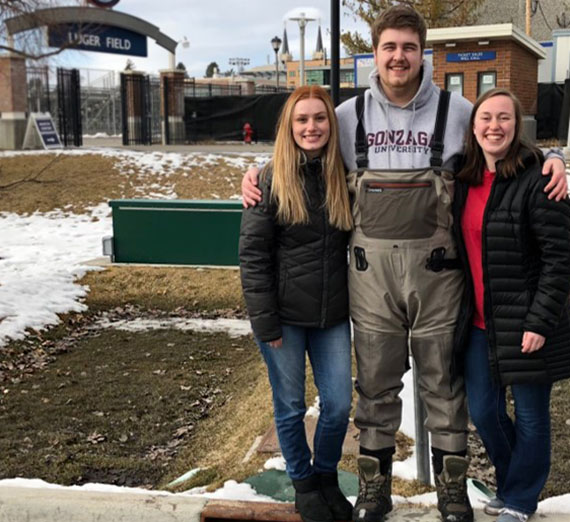Bio-infiltration Pond Provides County Data, Valuable Experience for Civil Students

Look around at anything built or retrofitted since the mid-1980s in Spokane County, the City of Spokane or Spokane Valley and you will likely see storm water swales, or bio-infiltration ponds. These low, marshy bits of land slow and capture runoff from roads and parking lots, filtering pollutants and other elements that would otherwise end up in storm drains. Effectiveness studies on these swales are required to maintain permits with the Department of Ecology, which is where Gonzaga civil engineering students come in.
A set of swales sits near the parking lot for the Martin Athletic Centre and the southern sports fields. Senior design teams first developed criteria for site selection, designed and constructed the bio-infiltration pond, and set up the monitoring system. Tests continue year after year on types and thickness of treatment media. They are overseen by instructor Aimee Navickis-Brasch, PE, a senior stormwater research and design engineer.
The project began in 2013, when Navickis-Brasch was approached by Matt Zarecor, principal engineer with Spokane County who had been serving as a liaison on the Gonzaga School of Engineering & Applied Science Senior Design Advisory Board. He suggested turning the effectiveness study into a senior engineering project, which has provided learning experiences for multiple student teams and valuable data for Spokane County.
“Having the fresh perspectives of the students each year has been a great experience,” Zarecor says.
While each new team of students brings a unique view and sense of enthusiasm, they also build on the progress made by those who worked on it in years past. Having to “pass the torch” to a future team gives these students a real-world experience.
“So long as we are getting good information and the students are learning, the process will continue,” said Zarecor. “I would encourage other organizations to work with the University. It’s been a fantastic experience for us and the students get a valuable learning opportunity.”
If you would like to discuss the possibility of working with a Gonzaga School of Engineering and Applied Science senior capstone project team please contact Toni Boggan at boggan@gonzaga.edu or 509-313-3913.
